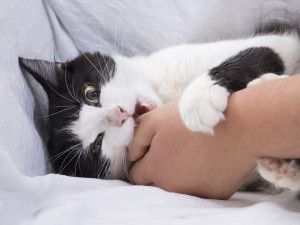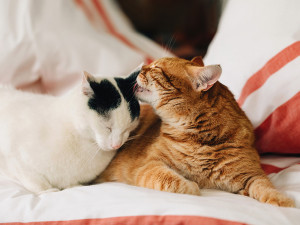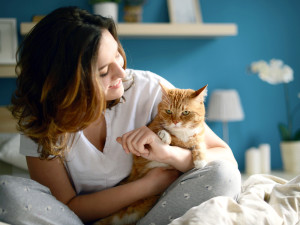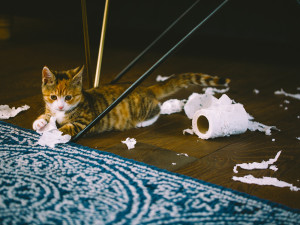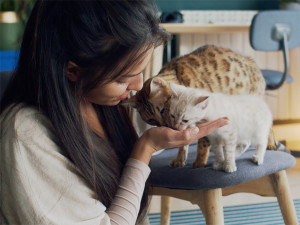Just a Nibble, or Something More? 5 Reasons Why Your Cat Bites Your Nose
Here’s why what seems like aggression may actually be affection.

Share Article
In This Article:
Why Does Your Cat Bite Your Nose?opens in a new tab How to React When Your Cat Bites Your Noseopens in a new tab When Should You Worry About This Behavior?opens in a new tab How to Address This Behavioropens in a new tab
The ways cats show affection can both be very cute and also very confusing. Biting while purring, as well as licking and then biting, are both behaviors that are based in love and affection. But they can also be a bit puzzling. Such is the nature of cats, and that’s why we love them.
Here’s another confusing behavior from some cats: biting their pet parent’s nose. Affection is one reason why they do that, but there are also many other motivations for why your cat might bite your nose. These may include love and affection, looking for attention, wanting to playopens in a new tab, being overstimulated, and possibly showing stress or anxiety. Here’s how to “read” why your cat may be going for your nose.

littleKin™ is Kinship’s home just for puppy and kitten parents. Bop over to check out expert advice, new pet tools, and special deals—all curated for your newest family member.
opens in a new tabMain takeaways
A cat might bite your nose for reasons ranging from affection to showing stress.
Your reaction should depend on what your cat’s nose biting means.
You should worry if your cat’s nose biting seems aggressive.
You can indicate to your cat that nose biting is not OK.
Why does your cat bite your nose?
There are many different reasons why a cat will bite your nose. Feline behavior and feeding coach Jennifer Van de Kieftopens in a new tab says that there might first be a pretty obvious reason: “If you stick your face in your cat’s face, your nose is sticking out making it an easy target.” But there are other reasons that your cat might take a nip at your nose.
Love and affection
This can be a sign of affection from your cat. Cats nibble at each other’s faces, so your cat giving you a little bite on the nose, especially if a lick comes before or after itopens in a new tab, is a pretty good sign that your cat is giving you a love bite.
Seeking attention
Aside from a statement of affection, a nose bite from a cat might be a way for your cat to signal they want your attention. A little nip on the nose from your cat might be their way of saying they’d like more pets or playtime, which is reminiscent of how kittens may play with their mothers.
Playful behavior
A bite on the nose might have the same message that pouncing or pawing has: Your cat is ready to playopens in a new tab and wants you to participate in some fun playtime. Look for other body languageopens in a new tab that signals your cat wants to play like dilated pupils, flicking their tail around, or meowing.
Overstimulation
Nose biting can also be a sign that your cat is done with playtime or pet time. They may have reached their limit for attention, and a little bite on the nose signals that it’s time to back off. This may be coupled with other body language indicators, such as flattened ears or a twitchy tail, which signs your cat needs some alone time.
Stress or anxiety
A nose bite might also signal that your cat is feeling stressed or anxiousopens in a new tab. Look for body language such as destructive behaviors or excessive meowing. It’s also important to note that environmental changes in a cat’s home (like a new cat) might cause distress.
How to react when your cat bites your nose
How you react when your cat bites your nose should depend on the reason your cat is biting it and what it feels like. If it’s a love bite or a playful nibble, you can usually ignore them. But if it’s something you don’t like, you can firmly tell your cat “no” and gently push them away. However, if the bite seems like it’s out of stress or overstimulation, you should give your cat some space and check out the environment to see if there’s anything that could be causing them distress.
When should you worry about your cat’s nose-biting behavior?
Figuring out why a cat is biting requires paying close attention to their needs and body language. Also, the type of bite is key. Did it hurt? Was it gentle? Van de Kieft notes that keeping track of when the biting occurs is likewise important. “If it’s happening frequently…again, detective work is key,” she says. “Try to figure out what your cat needs.”
How to address nose-biting behavior in cats
If the nose biting is becoming too much, gently pushing your cat away and telling them “no” — after they bite your nose — is a way to signal that the action is not acceptable. “I would avoid putting your face in your cat’s face,” Van de Kieft adds. “Give them something else to bite, such as a kicker toy. And praise them for using it.” However, if the biting seems to come from an aggressive or anxious place, calling your veterinarian is always a good idea.
Bottom line
When your cat bites your nose it’s usually meant affectionately or playfully, and shouldn’t be anything to worry about.
But it’s always important to read your cat’s body language: If a nose bite seems to come from a place of aggression or overstimulation, you should figure out the reason behind it.
FAQs
Why does my cat lick and then bite me?
When a cat licks and then bites you, it can be a sign of affection or a grooming behavior. It just means that you are your cat’s person and that they love you. But always be sure to observe your cat’s behavior for signs of overstimulation or stress.
When a cat licks your face, what does it mean?
It can mean affection, grooming, or even a way of getting your attention for playtime. You should avoid letting your cat lick your face, since bacteria in the cat’s mouth could potentially cause infection if it comes into contact with any open wounds or sores.
Why is my cat obsessed with my nose?
Your nose is a way for your cat to become familiar with your scent. They may show affection by biting it , rubbing itopens in a new tab, or licking it. Essentially, it’s their way of saying hello and that they love you.
Why does my cat bite my face while being affectionate?
When your cat gently bites your face, it’s considered a love bite, a sign of affection showing that your cat loves you. However, if it’s a behavior that bothers you, telling your cat “no,” and gently nudging them away from your face, can help reinforce that face biting is a behavior that they shouldn’t engage in.

Kerensa Cadenas
Kerensa Cadenas is a writer based in New York. She’s previously worked at The Cut, Thrillist, Cosmopolitan, and Complex. Her work has been featured in Vulture, GQ, Vanity Fair, and others.
Related articles
- opens in a new tab
What Is the Best Antibiotic for Cat Bites?
When playtime gets a little rough, here’s how to take care of yourself.
- opens in a new tab
Why Does My Cat Randomly Attack and Bite Me?
Is this playtime, or...
![Two tabby cats cuddling each other with their eyes closed]()
Cats Aren’t Loners, After All
Cat behaviorist Kristiina Wilson on the importance of socializing cats.
![Woman trying to hug a grumpy orange cat.]() opens in a new tab
opens in a new tabPeople Are Bad at Knowing When Their Cats Are Pissed, New Study Says
We can tell when cats are happy, but we’re pretty bad at figuring out when they’re not.
![A calico tabby kitten chewing and tearing a roll of toilet tissue.]() opens in a new tab
opens in a new tabWhy Does My Cat Chew On Everything?
How to decode your cat’s chewing habits when they’re nibbling on all the things.
![kittens licking woman's hand]() opens in a new tab
opens in a new tabCurious Cat Behavior: Why Does My Cat Lick Me?
Hey, everybody’s got their thing.

